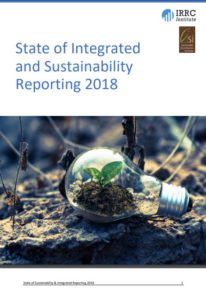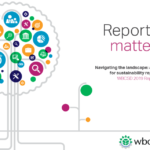
Large public company sustainability reporting is maturing rapidly, with financial data presented alongside growing social and environmental metrics and quantified goals. But despite investor interest, most companies in the S&P 500 have not adopted fully integrated corporate reporting, a new report reveals.
State of Sustainability and Integrated Reporting 2018, commissioned by the Investor Research Responsibility Center Institute (IRRCi) and authored by the Sustainable Investments Institute (Si2), finds that:
- 78 percent of S&P 500 companies issue a sustainability report.
- 40 percent of S&P 500 companies include voluntary sustainability discussions in annual financial reports or other regulatory filings. This is a key signal that an increasing number of companies believe sustainability issues are financially material. The reporting, however, varies widely.
- Among companies that issue sustainability reports, 95 percent offer quantified, annually comparable environmental performance metrics; two-thirds set quantified and time-bound environmental goals. Some 86 percent offer social performance metrics, but only 40 percent set quantified social goals.
- Only 14 S&P 500 companies issue what Si2 considers to be fully integrated reports, though this is a 100 percent increase from five years ago. Integrated reporting provides a holistic look at material information that goes beyond corporate financial disclosures and gives investors insight on a company’s risk and value creation potential. It is endorsed by the Principles for Responsible Investment (PRI), backed by PRI signatories with $82 trillion in assets under management.
“It’s significant progress that sustainability reporting is mainstream and that the majority of companies provide more relevant and quantified information,” said Jon Lukomnik, IRRCi executive director. “But investors still aren’t provided with a complete view of a company’s material environmental and social information, which would help investors make informed decisions.”
Lukomnik also noted that only 36 percent of these sustainability reports included external assurance. For 90 percent of these sustainability reports, the assurance was only partial and usually related to greenhouse gas emissions.
“Integrated reporting pushes the corporate disclosure envelope, but its early adopters are responding to a huge unmet demand in the investment world for quantified, material data to assess company strategies in our rapidly changing world,” said Heidi Welsh, Si2 executive director
Report author Sol Kwon, a senior consultant at Si2, observed, “Our report helps draw back the veil on what companies are actually doing, and explores why they increasingly look at environmental, social and governance (ESG) metrics to find opportunity, not just risk.”
The report shows interest in integrated reporting is higher than ever, and that a sea of new reporting frameworks has raised investor expectations for companies and shaped their sustainability disclosures. Still, U.S. company reporters navigate the landscape in idiosyncratic ways; 97 percent customize rather than directly follow current frameworks from organizations such as the Global Reporting Initiative, the International Integrated Reporting Council and the Sustainable Accounting Standards Board.
Download the report here.



